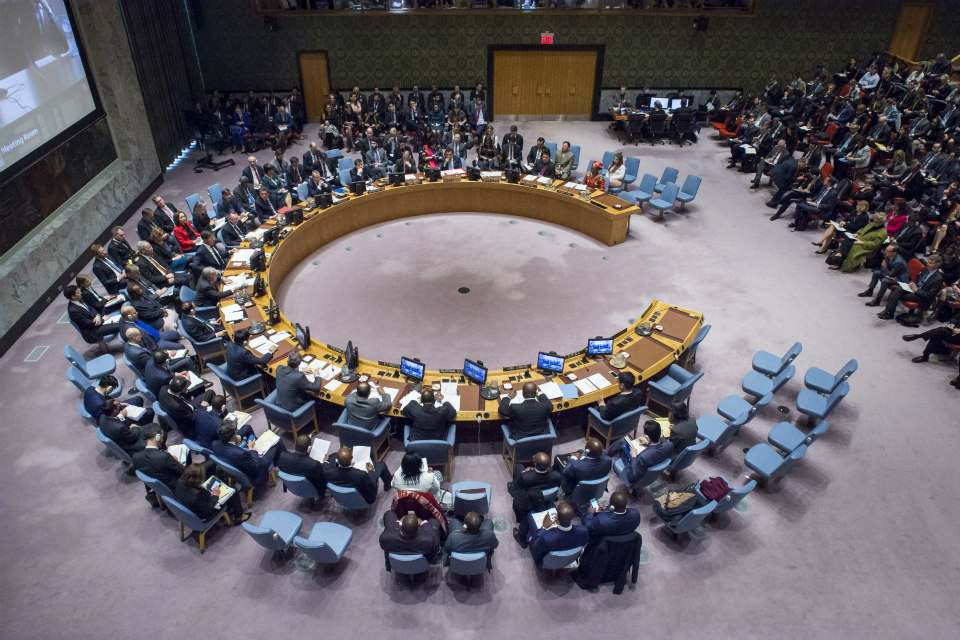Protecting Victims of Chemical Weapons Attacks in Syria, Salisbury and Internationally
Statement by Ambassador Karen Pierce, UK Permanent Representative to the UN, at the Security Council Briefing on Syria Chemical Weapons.

Thank you very much Mr President and thank you to the Deputy High Representative for his briefing.
I would like to start also by saluting Dr Mourad. Thank you for your work, sir, thank you to Ambassador Haley for drawing our attention to your presence here today and thank you to all those members of the UN, the ICRC and others who try so hard to help the people of Syria.
We’ve heard very graphic accounts, Mr President, of what exactly sarin is and how it attacks the central nervous system, leads to convulsions, paralysis and asphyxiation. And I am sure none of us will forget the footage we saw of the agony of the men, women and children who were poisoned by this nerve gas. As the other speakers have said, the OPCW Fact Finding Mission concluded that sarin was used in Khan Sheikhoun, and the JIM concluded that the Syrian regime was responsible for the attack.
Khan Sheikhoun was not the first time the regime used chemical weapons. In 2013, after hundreds were killed with sarin in Eastern Ghouta, Russia and the Assad regime promised the world that Syria would abandon all of its chemical weapons. Resolution 2118 decided that Syria would destroy its CW programme and join the Chemical Weapons Convention. And last month the Director General briefed the Council on Syria’s progress in doing just that. The Director-General noted that Syria had destroyed its declared programme very quickly, but that questions had arisen following inspections by the OPCW. And over time, Mr President, those questions have increased as inspectors deployed to Syria more than a dozen times. Chemicals were found which should have been declared, and yet Syria claimed not to know why. After long drawn out discussions, they finally declared the Syrian Scientific Studies and Research Centre – but there are still 21 serious issues remain unaddressed. This means that after more than four years of work, the OPCW is still unable to verify that Syria’s declaration is accurate and as we have heard many times, gaps, inconsistencies and discrepancies remain in Syria’s account of its declaration under the Chemical Weapons Convention. These are not trivial points of minor detail; they are substantive and the seriousness of the outstanding concerns has increased over time.
Mr President, my US and Dutch colleagues have eloquently drawn attention to the fact there can be no impunity and we echo their call on that. Last November Russia blocked the renewal of the mandate of the Joint Investigative Mechanism, and this leads us, as the Dutch Ambassador said, without a proper mechanism to determine accountability. I echo what he said about the way to explore all avenues to try to find a way of setting up accountability and responsibility for these weapons.
It is not just through its actions in Syria, Mr President, that Russia’s disdain for the international system manifests itself. The poisoning in Salisbury of two people with a military grade nerve agent endangered anyone who chanced to be in the vicinity; more than 130 people were potentially exposed to the agent, including a police officer. There has been no explanation offered as to how a Russian nerve agent came to be used in this manner.
On 22 March, a Foreign Ministry official in Moscow rejected the idea that Russia would accept the OPCW independent conclusions in examining the material from the Salisbury attack; and today Russia has called a meeting of the Executive Council of OPCW in the Hague to pre-empt the findings of the OPCW investigation.
Mr President, there should be no more victims of chemical weapons attacks, whether they take place in the warzone of Syria or in an English country town.
The rules-based international order and its institutions are too valuable to be put at risk in this way. It is our collective duty to protect them and seek accountability for those who choose to defy them. We fail the people of Syria, we fail the people of Salisbury, we fail the world if we do not act. Both my Dutch and American colleagues drew attention to the 100 years since some of the worst battles of the First World War. Allow me to conclude Mr President with a quote from a poem from that war, “He died in hell. They called it Passchendaele.” It has a new name now.
Thank you.